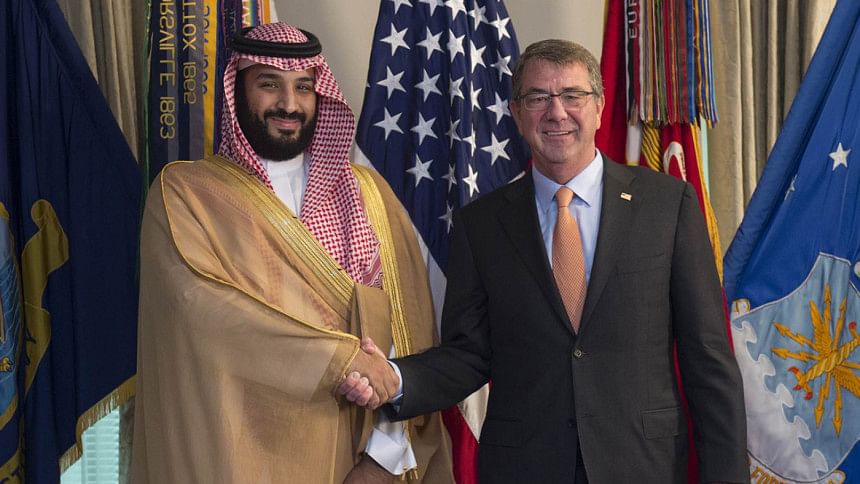US Officials fear Saudi collapse if new prince fails

The Saudi prince who seems to have won a family power struggle is meeting with US officials this week, reports NBC News.
These are the same officials who are concerned that the Saudi prince’s reign could be ruinous and hurt the regional security US officials crave.
Officials in the national security establishment believe Saudi Arabia is at a crossroads, and that if the prince doesn't succeed, now and later as king, there could be chaos in the Kingdom. "It's him or it's ISIS," said one Saudi expert who asked that his name not be used, reports NBC News.
Mohammed Bin Salman, Saudi Arabia's 30-year-old deputy crown prince, is on a tour of the US that will include New York and Silicon Valley.
His biggest meetings are with top US officials in Washington, DC, this week, including Secretary of State Kerry on Monday and a scheduled visit with President Obama at the White House Friday morning.
But the big news, suggest US officials, is that bin Salman is here at all, since he's technically second-in-line to his father King Salman's throne. He seems to have gained the upper hand on his cousin and rival Mohammed Bin Nayef, the crown prince and a longtime US favorite.
According to NBC News, the trip is essentially a state visit without the fanfare.
Bruce Riedel, former national intelligence officer for the Mid-East and a member of President Obama's transition team, said that US leaders now need to familiarize themselves with a man who may be king soon. King Salman is 80 and fragile and Bin Nayef, who the US would've preferred as his successor, is seriously ill.
"We've put a lot of markers down on Mohammed bin Nayef. It's the smart move to do the same with Bin Salman. It's an opportunity to get to know him."
US officials have been concerned about bin Salman since he took over the Kingdom's No. 3 job in April 2015, said Riedel. "A lot of people are worried about his recklessness."
Salman has embarked on a number of costly foreign interventions, including a war against the Iranian-backed Houthis in Yemen. The war had initial success, but became a stalemate that was costing the Kingdom $200 million per day until a ceasefire went into effect this spring. International human rights activists heavily criticized the Saudis for wanton attacks on Yemeni civilians.
Bin Salman also made a poor choice about the Kingdom's primary source of cash. As economic czar, he backed last year's decision to keep pumping oil despite plummeting global prices.
According to NBC News, Saudi Arabia's revenues have dropped, forcing huge cuts in social services, including the generous subsidies that the Kingdom pays to it citizens.
Those subsidies had been increased in 2012 following the Arab Spring as a way of keeping dissent at bay among the country's burgeoning --and restive -population of young males.
The Kingdom is so strapped that for the first time since the late 1990s, it's taking on significant sovereign debt. The Saudis tapped the debt market in April to the tune of $10 billion.
Under Bin Salman, the Saudi's relationship with its chief regional nemesis, Iran, has dramatically worsened, particularly after the Saudis executed a well-known Shiite dissident, Nimr al-Nimr, in January. Bin Salman backed the execution, which angered both the Iranians and Saudi Arabia's large Shiite minority.
Despite Bin Salman's perceived missteps, his meetings with Obama, Kerry and others show the administration has apparently conceded his succession is "a very real contingency," said Riedel. The US government invited him to visit and granted him wide access because they want to exert influence over him, in part because he's a largely unknown quantity - he doesn't speak English - and in part because the consequences are so great should his risky policies fail.
The US fears that if the Saudi military fails and its economy crumbles, the jihadis will take over. "[Bin Salman] has to win," said one US intelligence source. "It's that simple."
Bin Salman's schedule, provided by the Saudi royal court, shows the level of importance the US attaches to him. The Court says Bin Salman will have "a large number of meetings." On Monday he met with Kerry. On Tuesday, he met with top intelligence officials, including CIA Director Brennan and Gen. James Clapper, director of national intelligence, and with unnamed business leaders. On Wednesday, it was House Speaker Paul Ryan, and Minority Leader Nancy Pelosi, as well as US Secretary of Commerce Penny Pritzker.
On Thursday, he was at the Pentagon to meet with Secretary of Defense Ashton Carter, and he is scheduled to end the Washington leg of his trip Friday with a trip to the White House to meet the President.
According to one US intelligence official, this week's agenda has focused on imminent threats to the Kingdom's existence, like ISIS, al Qaeda, and the economy, while a traditional topic, Israel, may not be discussed.
The White House most wants to talk about oil and other economic issues, especially Saudi Arabia's plan to lessen its dependence on oil revenue -- an indication of US concern about the Kingdom's future well-being.
After Friday, Bin Salman moves on to New York and Silicon Valley, where he'll tout two of his planned economic reforms -- the sale of a piece of Aramco, the Saudi oil giant and the establishment of a $3 billion sovereign wealth fund. The reforms could prove attractive to companies wanting to invest in Saudi Arabia or get big tranches of the wealth fund's start-up money.
"The drive to diversify the economy is driven by big needs. One is to protect the country's economy and the national budget from the volatility of oil prices. Another is to generate the jobs that are required for a country in which 70 percent of the population is 30 or under in age, and where youth unemployment may be as high as 30 percent," said Dan Yergin, the economic historian and author of "The Quest" and "The Prize."
"A third reason is to make Saudi Arabia not only a powerhouse when it comes to oil but also a major power in global finance.
The US would've preferred to be meeting with the man they feel is a steadier hand, current Crown Prince Mohammed Bin Nayef, but Bin Nayef may never become king . Three current and former US intelligence officials give various assessments of his health. One senior military intelligence official said that bin Nayef may be near death.
A second official didn't go that far, but admitted, "He is not in great health."
A former US intelligence official said Bin Nayef's health was been compromised since a jihadi tried to assassinate him in 2009. The al Qaeda in the Arabian Peninsula suicide bomber, who detonated a bomb hidden in his rectum, killed only himself, but wounded Bin Nayef. The Saudis say publicly that Bin Nayef suffered minor wounds, but the former US official, an analyst, said Bin Nayef deals with "substantial pain management."
For years, the US had favored Bin Nayef, with whom many officials had longstanding relationships honed after the 9-11 attacks. As a senior US intelligence official told NBC News, "Crown Prince Muhammad bin Nayef is a strong and committed partner to the US, and he possesses an in-depth understanding on a range of security related issues. His pragmatic, proactive leadership in addressing complex security issues cannot be overstated."
Now, however, they realize that things have changed in the Kingdom and Bin Salman is the future.

 For all latest news, follow The Daily Star's Google News channel.
For all latest news, follow The Daily Star's Google News channel. 







Comments